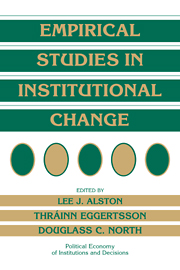Book contents
- Frontmatter
- Contents
- List of contributors
- Series editors' preface
- Acknowledgments
- Introduction
- A note on the economics of institutions
- Empirical work in institutional economics: an overview
- 1 Toward an understanding of property rights
- Economic variables and the development of the law: the case of western mineral rights
- 2 Impediments to institutional change in the former Soviet system
- Why economic reforms fail in the Soviet system: a property rights–based approach
- 3 Transaction costs and economic development
- Public institutions and private transactions: a comparative analysis of the legal and regulatory environment for business transactions in Brazil and Chile
- 4 The evolution of modern institutions of growth
- Constitutions and commitment: the evolution of institutions governing public choice in seventeenth-century England
- 5 Regulation in a dynamic setting
- The political economy of controls: American sugar
- 6 Price controls, property rights, and institutional change
- Roofs or stars: the stated intents and actual effects of a rents ordinance
- 7 Regulating natural resources: the evolution of perverse property rights
- Legally induced technical regress in the Washington salmon fishery
- 8 The politics of institutional change in a representative democracy
- A political theory of the origin of property rights: airport slots
- 9 The economics and politics of institutional change
- Paternalism in agricultural labor contracts in the U.S. South: implications for the growth of the welfare state
- Epilogue: economic performance through time
- Author index
- Subject index
- POLITICAL ECONOMY OF INSTITUTIONS AND DECISIONS
1 - Toward an understanding of property rights
Published online by Cambridge University Press: 05 June 2012
- Frontmatter
- Contents
- List of contributors
- Series editors' preface
- Acknowledgments
- Introduction
- A note on the economics of institutions
- Empirical work in institutional economics: an overview
- 1 Toward an understanding of property rights
- Economic variables and the development of the law: the case of western mineral rights
- 2 Impediments to institutional change in the former Soviet system
- Why economic reforms fail in the Soviet system: a property rights–based approach
- 3 Transaction costs and economic development
- Public institutions and private transactions: a comparative analysis of the legal and regulatory environment for business transactions in Brazil and Chile
- 4 The evolution of modern institutions of growth
- Constitutions and commitment: the evolution of institutions governing public choice in seventeenth-century England
- 5 Regulation in a dynamic setting
- The political economy of controls: American sugar
- 6 Price controls, property rights, and institutional change
- Roofs or stars: the stated intents and actual effects of a rents ordinance
- 7 Regulating natural resources: the evolution of perverse property rights
- Legally induced technical regress in the Washington salmon fishery
- 8 The politics of institutional change in a representative democracy
- A political theory of the origin of property rights: airport slots
- 9 The economics and politics of institutional change
- Paternalism in agricultural labor contracts in the U.S. South: implications for the growth of the welfare state
- Epilogue: economic performance through time
- Author index
- Subject index
- POLITICAL ECONOMY OF INSTITUTIONS AND DECISIONS
Summary
The structure of property rights critically affects economic outcomes by influencing the incentives of actors to create new wealth or to dissipate resources. In the economics of institutions, the term property rights refers to an actor's rights, which are recognized and enforced by other members of society, to use and control valuable resources. The control over resources also has an internal component. Various rules, and their enforcement by political organizations and by custom and social norms, provide external control, but usually actors also invest privately in control, depending on how much external enforcement the community provides. Although governments, for instance, outlaw breaking and entering and provide enforcement through the police and the courts, the level of external protection varies across polities, as does the level of trespassing. Owners respond by investing in various amounts of internal enforcement – with locks on doors, burglar alarms, guard dogs, and other measures. However, economies of scale make well-functioning social control, with formal and informal rules, a much more effective arrangement than heavy reliance on private (internal) control, and the economics of institutions pays much attention to the origins and nature of property rights because of their potential significance for economic prosperity and the creation of wealth.
The following essay by Gary Libecap is a case study of the determinants of mineral law in the western United States in the nineteenth century – a study of the evolution of property rights to mineral deposits.
- Type
- Chapter
- Information
- Empirical Studies in Institutional Change , pp. 31 - 33Publisher: Cambridge University PressPrint publication year: 1996
- 2
- Cited by

